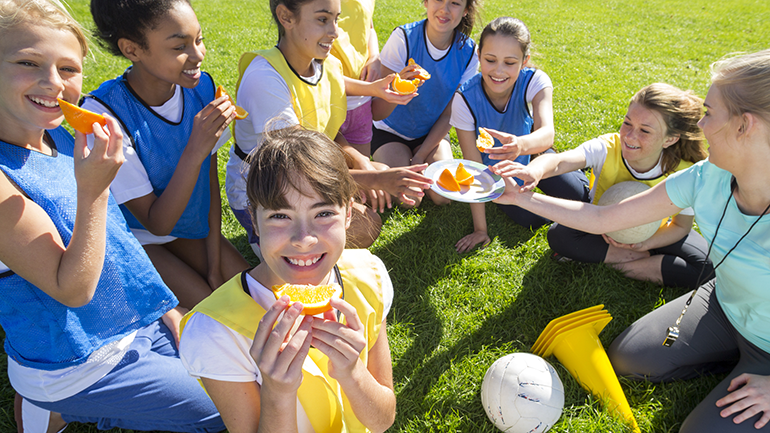
Growing bodies benefit from a variety of high quality foods every day in order to grow, develop and to play their best in their chosen activity.
During school sports tryouts, the worry that keeps most parents up is: “Will my child make the team?” But after they do, most parents focus on how to help their child succeed in their chosen sport, and that includes how to fuel them healthily for hydration and energy. Parents wonder if their child should be eating differently than usual, before, during and after their sports. Common questions include:
- “Should my child have dinner right before the game?”
- “Does my child need sports drinks for hydration?”
- “Does my child need a snack after playing soccer even if it’s almost lunch time?”
- “It’s my turn to bring snacks for my child’s team. What’s an easy and healthy snack idea?”
Kids who are competitive athletes or training for more than an hour at a time may benefit from consulting a registered dietitian about their specific nutrition needs. For children who play sports at a recreational level, the following tips may be helpful:
1. Food is fuel
Growing bodies benefit from a variety of high quality foods every day in order to grow, develop and to play their best in their chosen activity. Children’s busy schedules can make mealtimes challenging for families; taking a few minutes to plan ahead makes healthy eating easier. Offer your child foods from each food group every day.
2. Timing food before the game
It’s best to offer your child a healthy meal 2-3 hours before their game in order to give their body enough time to digest. If they start their activity with too much food in their stomach, they may get cramps. High fat foods like French fries or deep fried chicken can make your child feel sluggish. Healthier pre-game meal suggestions include:
- Chicken sandwich on whole grain bun, mustard, 1 cup skim or 1% milk and an apple or
- Whole grain toast with nut butter, banana, and 1 cup skim or 1% milk
If it’s not possible to eat a meal 2-3 hours before a game or practice, offer your child a snack 1-2 hours before their game or practice. A healthy pre-game snack includes foods from at least 2 food groups from Canada’s Food Guide such as:
- Cottage cheese and strawberries
- Half a sandwich with low fat cheese and tomato
3. Water is the best to hydrate your child before, during and after the game
Offer kids water to drink before a game so that they are well-hydrated from the start. Bring a filled water bottle and offer it regularly during and after the game.
Sports drinks are marketed as beverages that prevent dehydration and provide energy when exercising. However, sports drinks aren’t necessary for the average child engaged in routine or daily play-based physical activity. Healthyfamiliesbc.ca advises water is the best choice when playing a sport for less than an hour. It is only when a person is doing prolonged and vigorous activities (for example, running for more than one hour), that sports drinks may be helpful for hydration.
Be aware though, that the Canadian Pediatric Society advises that sports drinks and energy drinks pose potential health risks for children. These drinks have a high sugar content, with the average 700ml sports drink containing 10 teaspoons of sugar. Energy drinks carry additional health risks because they contain caffeine, herbs and amino acids, and are not recommended for children.
4. Offer fruit or vegetables for post-game snacks
Children don’t need snacks immediately after sports. However some teams like having their team share a snack to help build team connections and friendships. Choose fruits or vegetables as post-game snacks. High sugar snacks such as juice boxes, cookies, donuts and gummy fruit snacks offer little nutrition, too much sugar, and raise the risk of your child developing dental cavities. Healthy post-game snacks include:
- Banana
- Orange slices
- Grapes, strawberries and pineapple wedges on a kabob stick
- Apple
- Raw vegetables such as carrot sticks, snow peas, grape tomatoes, or zucchini sticks, with or without a tablespoon of hummus in a small paper cup.
These snacks are easy to prepare ahead and to bring to the game in a re-usable plastic container or zippered plastic bag. Talk to your child’s coach or team manager about asking parents to bring only healthy snacks after the game.
For more information on healthy eating for active kids, contact a registered dietitian at HealthLink BC by calling 811.
